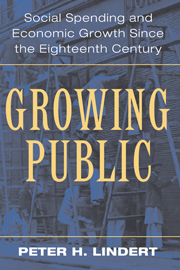Book contents
- Frontmatter
- Contents
- Preface to Volume I
- PART ONE OVERVIEW
- PART TWO THE RISE OF SOCIAL SPENDING
- PART THREE PROSPECTS FOR SOCIAL TRANSFERS
- PART FOUR WHAT EFFECTS ON ECONOMIC GROWTH?
- 10 Keys to the Free-Lunch Puzzle
- 11 On the Well-Known Demise of the Swedish Welfare State
- 12 How the Keys Were Made: Democracy and Cost Control
- Notes
- Bibliography
- Acknowledgments
- Index
12 - How the Keys Were Made: Democracy and Cost Control
Published online by Cambridge University Press: 26 December 2009
- Frontmatter
- Contents
- Preface to Volume I
- PART ONE OVERVIEW
- PART TWO THE RISE OF SOCIAL SPENDING
- PART THREE PROSPECTS FOR SOCIAL TRANSFERS
- PART FOUR WHAT EFFECTS ON ECONOMIC GROWTH?
- 10 Keys to the Free-Lunch Puzzle
- 11 On the Well-Known Demise of the Swedish Welfare State
- 12 How the Keys Were Made: Democracy and Cost Control
- Notes
- Bibliography
- Acknowledgments
- Index
Summary
Many have cast welfare states as nations that just don't see, or feel that the rich should bear, the soaring national costs of taxes and transfers. Yet the danger of such naive pessimism about public programs should be obvious by now. The case against social transfers can't be that simple, especially in the face of the evidence suggesting no significant net cost.
Chapters 10 and 11 have surveyed some institutional keys to the puzzle of how social transfer programs may not harm economic growth and well-being. The list of keys is eclectic and incomplete. We now have a better understanding of the tax mix practiced in welfare states and the limits on the damage done through work disincentives, both for young adults and for the elderly. These findings can only be suggestive, and we are a long way from an overall quantitative accounting.
Two main principles seem to have shaped this eclectic set of institutional keys:
The budget-stakes principle: While any economic system has lapses from peak performance, higher-budget countries are more aware of the need to choose efficient designs for their tax-transfer systems because the stakes are higher. The greater the share of taxes and transfers in GDP, the greater the marginal cost of choosing the wrong program design. There is evidence that the democratic political process was partly guided by this principle en route to those high welfare-state budgets.
The principle that universalism probably cuts costs. Over the centuries surveyed in this book, prosperity and democracy have allowed countries to economize on administrative and incentive costs by shifting from narrow and expensive taxes and transfers to broad taxes and broad entitlements.
- Type
- Chapter
- Information
- Growing PublicSocial Spending and Economic Growth since the Eighteenth Century, pp. 296 - 308Publisher: Cambridge University PressPrint publication year: 2004



